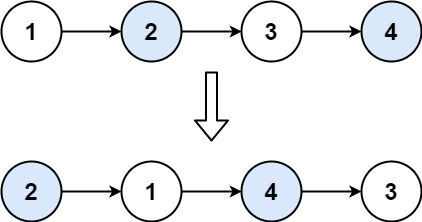给定一个链表,两两交换其中相邻的节点,并返回交换后的链表。
你不能只是单纯的改变节点内部的值,而是需要实际的进行节点交换。
示例 1:
输入:head = [1,2,3,4] 输出:[2,1,4,3]
示例 2:
输入:head = [] 输出:[]
示例 3:
输入:head = [1] 输出:[1]
提示:
- 链表中节点的数目在范围
[0, 100]内 0 <= Node.val <= 100
进阶:你能在不修改链表节点值的情况下解决这个问题吗?(也就是说,仅修改节点本身。)
# Definition for singly-linked list.
# class ListNode:
# def __init__(self, val=0, next=None):
# self.val = val
# self.next = next
class Solution:
def swapPairs(self, head: ListNode) -> ListNode:
dummy = ListNode(next=head)
pre, cur = dummy, head
while cur and cur.next:
t = cur.next
cur.next = t.next
t.next = cur
pre.next = t
pre = cur
cur = pre.next
return dummy.next/**
* Definition for singly-linked list.
* public class ListNode {
* int val;
* ListNode next;
* ListNode() {}
* ListNode(int val) { this.val = val; }
* ListNode(int val, ListNode next) { this.val = val; this.next = next; }
* }
*/
class Solution {
public ListNode swapPairs(ListNode head) {
ListNode dummy = new ListNode(0, head);
ListNode pre = dummy, cur = head;
while (cur != null && cur.next != null) {
ListNode t = cur.next;
cur.next = t.next;
t.next = cur;
pre.next = t;
pre = cur;
cur = pre.next;
}
return dummy.next;
}
}/**
* Definition for singly-linked list.
* struct ListNode {
* int val;
* ListNode *next;
* ListNode() : val(0), next(nullptr) {}
* ListNode(int x) : val(x), next(nullptr) {}
* ListNode(int x, ListNode *next) : val(x), next(next) {}
* };
*/
class Solution {
public:
ListNode* swapPairs(ListNode* head) {
ListNode* dummy = new ListNode(0, head);
ListNode* pre = dummy;
ListNode* cur = head;
while (cur != nullptr && cur->next != nullptr) {
ListNode* t = cur->next;
cur->next = t->next;
t->next = cur;
pre->next = t;
pre = cur;
cur = pre->next;
}
return dummy->next;
}
};
